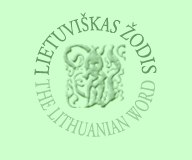Antanas Juska
(1819-1880), lexicographer and folklorist born in Daujotai, county of
Kaunas.Graduating from the Vilnius Theological Seminary, he was
ordained in 1843, and served as curate and pastor in several parishes,
the longest in Veliuona and Alsedziai. Although he never formally
studied philology or ethnology, he nevertheless distinguished himself
in both fields. Juska was the author of a dictionary of
the Lithuanian language, published by the Russian Academy of Science
in St. Petersburg. Three fascicles of the work entitled Litovskii
slovar’ were published posthumously in 1897, 1904 and 1922. The
work comprises some 70 000 words, including many which did not appear
in previously published dictionaries. He gathered words from the
living language spoken in these districts where he lived, especially
Veliuona and Vilkija. To illustrate usage he included whole phrases.
Initially the work of preparing the dictionary for publication was
undertaken by his brother Jonas Juska and later by a number of other
philologists, Jagic, Fortunatov, Vytautas Juska (the son of Jonas
Juska), Jablonskis, Buga and Slapelis. The editors checked the text
and changed some details, but the text remained basically unaltered.
Since written Standard Lithuanian in Lithuania Major was not yet
stabilized at that time, the dictionary’s accentuation, phonology,
and morphology were based on the dialect of the author’s birthplace,
but with some admixture of the other dialects. The dictionary is
especially valuable for its inclusion of unfamiliar words and their
forms and for its inclusion of expressions from popular speech. Rev.
Juska also wrote three unpublished dictionaries, Polish-Lithuanian,
Latvian-Lithuanian-Polish, and Lithuanian-Polish. Another important
work by Juska was a collection of Lithuanian songs. He wrote down
about 7 000 folk songs, some 5 000 of them from the district of
Veliuona. The first collection of 33 songs and their Russian
translation was published under the name of Litovskie narodnye
pesni (Lithuanian Folk songs) in St. Petersburg in 1867. The songs
collected by Rev. Juska are remarkable for variety of themes and for
his novel method of writing down and classifying the songs. He was the
first Lithuanian to record the names of the singers, giving their
social conditions and the occasion on which each song was sung. He
wrote down the songs in dialect, without changes or omissions, and he
classified some of the songs according to contents. These anthologies
are especially valuable in the study of Lithuanian folklore.
|

